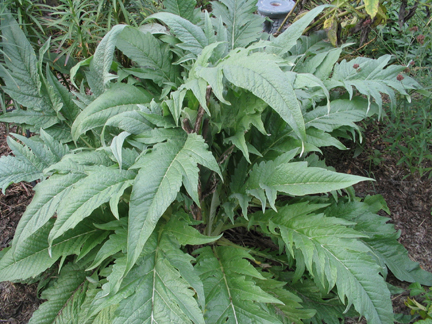CFSA Farm Tour – DIG and SEEDS
The third and finally stop on the farm tour was the dual urban gardens of Durham Inner City Gardeners (DIG) and Southeastern Efforts Developing Sustainable Spaces (SEEDS). The DIG program is youth oriented and works 1/2 acre of land. They sell the resulting produce at the Durham Farmers Market. The kids in the program are paid a stipend for their work as they plant, tend, harvest and attend their table at the market. DIG currently employs twelve Durham youth in its program.
SEEDS has youth programs but is also community oriented with community garden plots, teaching facilities and after school programs. SEEDS has 1 1/2 acres in mixed perennials and annuals as well as fruit trees, large compost facilities, two greenhouses and an outdoor classroom.
The DIG garden is about as urban as it can get without being situated in raised beds on a loading dock somewhere. Nestled near factories and train tracks, the noise of the city was never very far away. There was also the constant reality of “poaching”, which has the potential to ruin a kid’s experience with the garden if the particular crop they had started from seed became the target of theft. While not unique to cities (I never paid for sweet corn, peas, cabbage, onions or pumpkins when I was a kid in the country), it presents a unique problem when working in a non-profit, youth oriented setting. Stealing from acres upon acres of row crops is one thing, but taking all the peppers from a twelve foot row is completely different.
Like the garden’s coordinators, I would turn a blind eye to the occasional person jumping the fence to get some needed food. Sometimes folks have to steal food; as an adult I understand the concept. I might even be the one jumping the fence someday, but I would find it hard to explain it to a ten year old if they happened to catch me in the act of digging up their only row of sweet potatoes. The question that the coordinators are wrestling with at the moment – how to encourage the fence jumpers to get involved in the garden? Anyway, that is a long aside…
Through many years of soil work, composting and mulching, the garden beds have become very fertile. The okra plants in this picture are actually ten to twelve feet high, something I had never seen before. The bases of the plants were several inches around and looked like tree trunks on some of the larger plants.
To maximize space, the DIG garden incorporates some terrace beds where there used to be a steep slope.
A further indicator of the care they give their soil, this chard should have been dead in the summer yet it keeps on producing. The DIG folks have harvested this chard every week since mid-March. The stem bases of these plants were several inches around indicating a constant harvest and constant new growth.
On the other side of the street is the larger SEEDS space with its greenhouses, cold frames and education facilities. The gardeners use burlap coffee bags from a local organic roaster as mulch. The bags break down after a few months.
The outline of the garden is covered in perennials, mostly herbs and fruit trees. The cardoon pictured below was part of a wormwood and rosemary area.

Community members also tend to mushroom logs in a back corner of the garden.
I had visited SEEDS a few years ago under different circumstances. I was helping Kristin corral a few kids from Wilmington’s Community Boys and Girls Club. The kids were on my last nerve towards the end of the visit. They were more interested in picking unripe strawberries, making strange comments and laughing uncontrollably as our guide pointed out the Pussy Willows in the landscape. The garden has changed a lot since that visit and seemed to be more bountiful with more community garden beds and more compost bins integrated into the areas where they would be easiest to reach. The SEEDS project is set to take on another five acres elsewhere in Durham, which will extend its education possibilities as well as well get more kids involved in working on a small farm.
November 15, 2007 at 10:22 pm
It’d be nice to see this concept extend to many cities, especially small towns where the whole community could be involved.
November 16, 2007 at 8:56 am
Many moons ago when SEED was just getting up and running, I tried to volunteer there. Nobody ever called me back. I’m so glad they’ve gotten through those difficult times, because I love the SEEDS concept, too.
Back then it was only kids. I have to admit I’d not kept up with the changes. Some volunteering is in my future, don’t you think?
November 16, 2007 at 9:08 am
I think if you just show up it might be better than calling. They were going a hundred miles an hour while we were there, and it might be best just to throw yourself into that.
November 17, 2007 at 6:23 pm
Good call. I’ve emailed a couple of times since I made this comment and haven’t heard back.